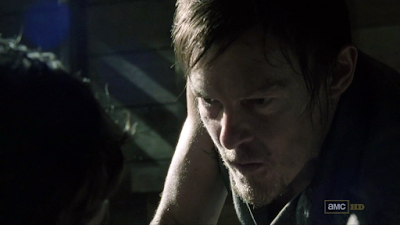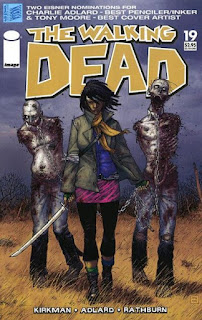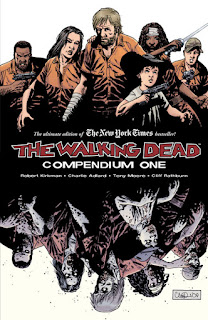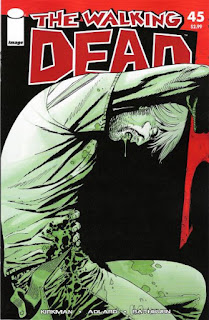My very first article on this site, many months and miles ago, was a fan girl love fest called
Five Reason Why Daryl is My Favorite. After Season 2’s finale,
Beside the Dying Fire, I have found that I just gotta’ go there again. Even though I’ve been down this road before, Daryl was, as a character, still in its infancy. He is more of an adolescent now. He’s grown and matured a bit; he’s learned from some of his mistakes; he seems on his way to becoming a responsible, respected member of society. (We only wish we could say this about all REAL children, don’t we?)
My previous reasons for liking this character so much were:
Daryl is a wild card;
Daryl is Mr. Practical;
Daryl calls it like he sees it;
Daryl is decisive;
Daryl has feelings, but he doesn’t let them control him.
Most of those still stand, with slight adjustment. Although he is less of a wild card and his actions are not as unpredictable, he still surprises us frequently. He is still very practical. He still calls things like he sees them. Decisiveness is still a key part of his character, although he is now somewhat less likely to shoot first and ask questions later. He also still keeps control of his emotions, well mostly. He still has some issues with that anger thing. But having now seen Daryl in a variety of situations and been given clues to his budding friendships with the others, we have a better picture of the man he truly is.
So, I now give you Five Reasons Why Daryl is STILL My Favorite.

1) Daryl’s observation skills are exceptional. Several scenes in Season 2 have shown that Daryl notices damn near everything, even if he doesn’t feel the need to share. The perfect example is when he deduced that Shane killed Otis. Daryl told Dale in Judge, Jury, Executioner that he knew Shane had probably killed Otis because Shane “showed up with a dead guy’s gun” after the expedition to the high school. My husband, Jeff, with his own brilliant observation skills, quickly pointed out that detail when Save the Last One aired. As Shane wrenched Rick’s Colt Python from Otis’s hand, Jeff commented “So how is he going to explain having the gun?” We were both disappointed that no one in the group seemed to notice. Indeed, if events had played out the way Shane claimed, there’s no way he would’ve had the Python. It would still be in the undead claw of walker Otis. But the writers were only biding their time and we eventually had a payoff: someone HAD noticed. I’m very glad it was Daryl, because it added an air of intelligence that wasn’t apparent when the character was first introduced.
Although he seems by nature to be a suspicious guy, more than that makes Daryl’s observation skills so keen. His ability to see what others overlook comes in large part from his skills as a hunter. (Granted, he must be some kind of super tracker if he can notice – in pitch darkness – two sets of tracks, blood on a tree, and that “a little dust up occurred here,” but this is what suspension of disbelief is all about. If you can accept Andrea as an instant sharpshooter, you can accept that Daryl has freaky tracking skills.) Hunters must quietly observe their prey as they stalk it; to make the kill, they must pay attention to minutiae others would miss. It was nice to see Daryl’s tracking skills translated into his catching details about Shane’s story that the others didn’t catch. Both his ability to track things – be they escaped prisoners, missing little girls, or game animals for dinner – and his habit of noticing things about people that others don’t, Daryl’s skills of observation are HIGHLY valuable to the group.
2) Daryl’s ability to read people and situations is almost uncanny. This goes hand in hand with his observation skills. If you pay close attention to someone’s body language or improbable details in a story someone tells, you will often be able to figure out what people are really thinking or that there are things they aren’t telling you that they should be. In the conversation mentioned above, Daryl tells Dale something that shows he easily identified Rick’s inability to see clearly things about Shane. Regarding Rick’s not picking up on the likelihood that Shane killed Otis, Daryl says “Rick ain’t stupid. If he didn’t figure it out, it was cuz he didn’t wanna.’” Wow… a pretty damn good call on how Rick viewed Shane. Rick, so blinded by what Shane used to be, could not see what Shane had become. Daryl saw that Rick’s long held feelings clouded his perception of his best friend. Daryl also saw that it was Rick’s own fault if he couldn’t or wouldn’t adjust his view of Shane. Daryl just didn’t feel the need to point this out to Rick.
He was not shy however about making it known that he thought Shane was lying in Better Angels. When he asked Shane how Randall was able to get the jump on the former deputy despite only weighing “a buck twenty-five,” it was pretty obvious he could read Shane and the situation for what it really was. Didn’t mean he knew what Shane was up to, only that something didn’t smell right about Shane’s description of events. It also reinforced the fact he calls it like he sees it and he called “bullshit” on Shane’s story.
3) Daryl is willing to help Rick with the “heavy lifting.” In both interrogating Randall and shooting Dale, Daryl showed he is capable of carrying out unpleasant tasks if they need to be done. This is something that others – and yes, I’m talking about Shane here – have not been either willing or able to do. I suspect that even if Shane had remained alive, Daryl would still have become Rick’s wingman and Shane’s role in the group’s leadership would have diminished significantly.
I’ve seen many comments online recently describing Daryl as “Rick’s enforcer,” but I disagree with that assessment. Daryl is not an enforcer by the classic definition of the word. According to Miriam Webster, my favorite dictionary, “enforcer” is defined as “1.) one that enforces 2.) a: a violent criminal employed by a crime syndicate; b: a player known for rough play and fighting.” (There are other definitions, but only one of the 10 or so I could find would fit Daryl’s role as “one whose job it is to execute unpleasant tasks for a superior” and to me, that is a definition by usage, not a meaning that comes from the actual word history. It’s a minor academic point, but I am a minor academic!) An enforcer’s role is to ensure compliance with rules or help maintain rule over a group. Daryl does neither. An enforcer’s role is to be a violent man. Daryl is not. He is simply a man capable of violence. There is a difference. Daryl doesn’t necessarily LIKE violence; he is however very good at it, when he has to be.
4) Daryl gets some of the best lines. If it is smart-assed or sarcastic and delivered dead-pan with a dash of piss and vinegar, chances are Daryl is the one saying it. My favorites in Season 2 include:
“Climb out of my ass, old man!” to Dale when he ask asks if Daryl let Lori go with Maggie in Triggerfinger.
“It ain’t the mountains of Tibet; it’s Georgia!” to Andrea when she asks if Daryl thinks they’ll find Sophia in Save the Last One.
“Look at him. Hanging up there like a big piñata.” To Andrea when they find the tree walker in Save the Last One.
“That’s the third time you’ve pointed that thing at my head. You gonna’ shoot me or what?” to Rick in Chupacabra, followed of course by “I didn’t think you’d do it” when Andrea actually takes a shot at him.
“Shoot me again, you best pray I’m dead” to Andrea in Secrets.
“It’s as good a night as any” to Herschel in Beside the Dying Fire when Herschel tells him “It’s my farm; I’ll die here.”

5) Daryl is part of the group, again. Early in Season 2, he accepted direction from Rick in the search for Sophia. As he put so much of himself into that search, we could see Daryl slowly becoming more a part of the group. He opened up a bit to Andrea and Carol. He defended Rick to his hallucination of Merle. But let’s face it; if they planned to keep Daryl in the series, the writers had to give him greater depth and more back story. They had to give him more emotional ties to the group. (Sadly, they have yet to do the same things for T-Dog, but that’s another article!) To say Daryl withdrew emotionally and physically from the others after Sophia was discovered in the barn would be a huge understatement. Daryl got the bitterness and pain out of his system the only way he knew how: he got mad; he yelled at people; he blamed the innocent; and he stalked off to pout and cool down. But, eventually, he dealt with the situation and his anger about it lessened.
Daryl was still standoffish, but he slowly reintegrated. For example, he told Dale in Judge, Jury, Executioner that the group was “broken” and that he was better off fending for himself, but he didn’t leave. Daryl was also willing to accompany Rick to remove Randall from the farm in Better Angels, even though he was unconcerned with Randall’s fate. His only voiced thought on the situation was that once they were done “this whole pain in the ass will be a distant memory,” adding “good riddance.” A moment later, when Rick specifically asks if he’s “good with this,” Daryl replies “I don’t see us tradin’ haymakers at the side of the road; nobody wins that fight.” This provides a subtle reminder that Daryl, unlike Shane, won’t question Rick’s decisions or challenge Rick’s authority. He showed that despite being a loner who was perfectly capable of surviving without the group he was willing to be a team player. When the group comes back together on the highway after the farm is overrun in Beside the Dying Fire, it was especially heartening to see Rick and Daryl lock hands like they did. To me, that action showed Daryl’s growing connection to Rick as did his defense of Rick to Carol later beside the campfire when Carol appeared to be trying to talk him into either taking control of the group or leaving it. Daryl isn’t interested in her suggestion. Now that it is now longer a democracy, maybe Daryl will become Rick’s enforcer instead of just Rick’s doer of difficult and dirty deeds.
This last point brings me to a very important question: What happens when Merle returns? Merle is said to be returning at some point in Season 3. Daryl, in his new position as Rick’s wingman, you know, the position that Shane, uh, vacated, will undoubtedly be torn between his brother and the group. Yes, Merle is kin, but the group is becoming more of a “family” to Daryl then I think the older Dixon boy was ever capable of being, shared DNA be damned. Hell yes, there will be fireworks between the brothers, that goes without saying. I’ve said it before, but it bears repeating: watching Michael Rooker and Norman Reedus on screen together is well worth the price of admission. Hell, it’s worth the cost of two tickets!
As the writers explored Daryl’s character over the course of Season 2, Reedus continued to use body language to provide his own clues about Daryl’s personality. At times, Daryl’s inner struggle with being a part of the group versus keeping himself on its periphery – a key element for the character’s development – was almost painfully obvious. We often saw him off to the side of the group, unengaged, which showed us two things: 1.) he was still a loner and not comfortable connecting with people or forming close friendships; and 2.) he was always watching and evaluating his fellow survivors, trying to determine if they were worth his time and effort.
His mannerisms and facial expressions also provided insight into Daryl’s thoughts. Sometimes that vision was cloudy; other times it was as clear as an August morning in Georgia after the haze of dawn has burned away. As Shane told the story about Otis’s last moments, we saw Daryl in the background, saying nothing, just squinting as he listened. Was he skeptical of Shane’s tale or just bored and ready to get the whole affair over with so he could continue the search for Sophia? As the story played out, it appeared to have been both. But when he questioned Shane about his story regarding Randall, there was no confusion over what Daryl was really thinking. His wrinkled brow and “that just don’t make no sense” expression emphasized the fact he wasn’t buying what the other man was trying to sell.
Finally, another important element for the character’s development, the
amount of anger he displayed changed minutely. Daryl still had a couple of verbal explosions, but all in all, he seemed to have mellowed somewhat, perhaps because he is more distanced by time from Merle. In Season 2 there were no squirrels thrown at anyone, no knives pulled, fewer veiled threats and angry, arms-folded-across-his-chest stances, and much less glaring. Okay, so there was still a LOT of glaring, but for the most part, it felt less… hostile. Which brings to mind a comment that I once heard Reedus make; he said that giving people dirty looks “kind of turned into a career” for him. Good thing too, because trust me, dude, we fan girls LOVE those dirty looks! Keep ‘em coming.









































